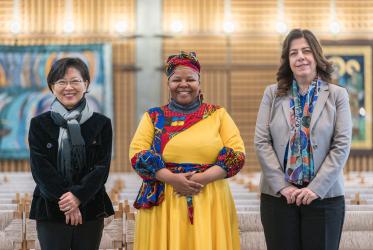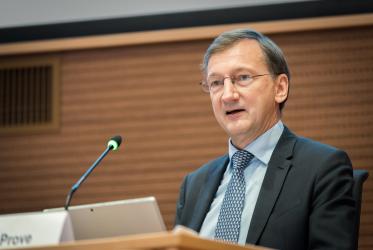Statement on International Human Rights Day
Is not this the kind of fasting I have chosen: to loose the chains of injustice and untie the cords of the yoke, to set the oppressed free and break every yoke? Isaiah 58:6
At its inaugural Assembly in Amsterdam in 1948 – the same year as the Universal Declaration of Human Rights (UDHR) was adopted by the UN General Assembly – the World Council of Churches declared:
We are profoundly concerned by evidence from many parts of the world of flagrant violations of human rights. Both individuals and groups are subjected to persecution and discrimination on grounds of race, colour, religion, culture or political conviction. Against such actions, whether of governments, officials or the general public, the churches must take a firm and vigorous stand, through local action, in cooperation with churches in other lands and through international institutions of legal order.
Sixty-seven years later, on International Human Rights Day 2015, our concerns have not diminished. Faced with both persistent and new challenges to the realization of human rights for all without discrimination, our call for cooperation and action must be renewed and strengthened.
The World Council of Churches values and supports international human rights law as an essential framework of accountability for the violation of and failure to respect, protect and fulfil fundamental human rights and freedoms. This legal framework helps protect against tyranny by the majority and makes a critical contribution to the broader and fuller realization of the inherent God-given dignity of all human beings.
Together with the UDHR, the International Covenant on Civil and Political Rights (ICCPR) and the International Covenant on Economic, Social and Cultural Rights (ICESCR) – both adopted by the UN General Assembly in 1966 – constitute the “International Bill of Human Rights”. As UN High Commissioner for Human Rights Zeid Ra’ad Al Hussein has observed, the ICCPR and the ICESCR are “the bedrock of what we now recognize as international human rights law”. More than 160 States have ratified each covenant. And yet, still today, 27 countries have ratified neither of them, and eight States have ratified only one.
On this International Human Rights Day, the World Council of Churches joins the call for universal ratification of both covenants; the vision of human dignity is incomplete without the totality of civil, political, economic, social and cultural rights and freedoms.
In meeting the many current and severe challenges, obstacles and threats to the realization of human dignity and rights today, the legal architecture, of which the two covenants form the bedrock, is more important than ever. Let us make these foundations secure.





